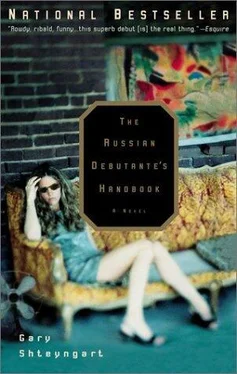Gary Shteyngart - The Russian Debutante's Handbook
Здесь есть возможность читать онлайн «Gary Shteyngart - The Russian Debutante's Handbook» весь текст электронной книги совершенно бесплатно (целиком полную версию без сокращений). В некоторых случаях можно слушать аудио, скачать через торрент в формате fb2 и присутствует краткое содержание. Город: New York, Год выпуска: 2003, ISBN: 2003, Издательство: Riverhead Books, Жанр: Современная проза, Юмористическая проза, на английском языке. Описание произведения, (предисловие) а так же отзывы посетителей доступны на портале библиотеки ЛибКат.
- Название:The Russian Debutante's Handbook
- Автор:
- Издательство:Riverhead Books
- Жанр:
- Год:2003
- Город:New York
- ISBN:0-7865-4177-6
- Рейтинг книги:4 / 5. Голосов: 1
-
Избранное:Добавить в избранное
- Отзывы:
-
Ваша оценка:
- 80
- 1
- 2
- 3
- 4
- 5
The Russian Debutante's Handbook: краткое содержание, описание и аннотация
Предлагаем к чтению аннотацию, описание, краткое содержание или предисловие (зависит от того, что написал сам автор книги «The Russian Debutante's Handbook»). Если вы не нашли необходимую информацию о книге — напишите в комментариях, мы постараемся отыскать её.
and
. The Russian Debutante’s Handbook Bursting with wit, humor, and rare insight,
is both a highly imaginative romp and a serious exploration of what it means to be an immigrant in America.
The Russian Debutante's Handbook — читать онлайн бесплатно полную книгу (весь текст) целиком
Ниже представлен текст книги, разбитый по страницам. Система сохранения места последней прочитанной страницы, позволяет с удобством читать онлайн бесплатно книгу «The Russian Debutante's Handbook», без необходимости каждый раз заново искать на чём Вы остановились. Поставьте закладку, и сможете в любой момент перейти на страницу, на которой закончили чтение.
Интервал:
Закладка:
A knowledgeable Jew in a similar position expects history to spare any pretense and kick him directly in the face.
A Russian Jew (knowledgeable or not), however, expects both history and a Russian to kick him in the ass, the face, and every other place where a kick can be reasonably lodged. Vladimir understood this. His take on the matter was: Victim, stop lazing about in the grass.
He woke up the next day to find himself lying beside Morgan’s ethereally pale back, the sides of her breasts rounding out beneath her like little pockets of rising dough. His darling was completely unaware of her Volodechka’s curious night.
His darling was completely unaware of many things. Because no matter what acts of political or romantic inanity she was performing with her Tomaš (likely some impoverished young Stolovan reeking of wet shoes and garlic), no matter the winged lion or minotaur or gryphon that lived in her sealed secret room, and no matter those fashionable American panic attacks that gave her the license to misbehave—ultimately, it would be Vladimir’s world, with its moral relativism, its animalistic worship of survival, that would leave Morgan short of breath.
In some ways it was a repeat of Vladimir’s grand battle with Fran, a battle between the luxury of ideas and the refugee’s foremost responsibility of staying alive, a battle between nebulous historical notions (Death to the Foot!) and the complicated facts on the ground—the Gusevs and their Kalashnikovs, the men with the shaved heads cruising the streets of the continent. And it was precisely Vladimir’s realism that made him a better person than Morgan, that coated him with the patina of tragedy, that excused his deviations from Normalcy and condemned Morgan’s deviations from the same.
Was he a good person or a bad person?
What a childish question.
HE MOVED.
Half an hour after he had awoken, five hours after he was nearly killed, Vladimir was at the Groundhog’s. Didn’t call, didn’t knock, just came and made himself known—let the whole world know who is this Girshkin that he doesn’t have to call or knock.
Visiting his boss was now a crosscultural experience. The Hog had left the “gangsta” compound, along with his latest girlfriend and secondary and tertiary consorts, for a new development hideously developing itself in a green corner of Greater Prava: the Brookline Gardens. Those familiar with the real Brookline, the one in Massachusetts, would not be disappointed. The Prava version was the apotheosis of North American upper-middle-classdom distilled in ten rows of dark brick townhouses and archways trellised with vine. An enormous sloping lawn at the entrance had been planted with pink, red, and white peonies to spell out “Welcome” in English; while in a far corner, a self-contained Food Court was already under construction, spreading out its feelers for the rest of the hypothetical mall. The only concession to local reality was the fact that the whole place would fall apart by the turn of the millennium.
Into this rarefied habitat came Vladimir with arms crossed and scowl at the ready. Peerless Jan (knighted, beatified, given a sweet bonus) dropped him off at the Groundhog’s unit on the corner of Glendale Road and MacArthur Place. The entrepreneur’s bodyguards were asleep in a station wagon parked in the driveway, their arms hanging out of the rolled-down windows like pinstriped tentacles. As promised, Vladimir did not knock. He walked right through the empty living room, his mobile phone at the ready, its antenna fully extended like a modern-day broadsword, to find the Groundhog breakfasting in his little breakfast nook.
The Groundhog looked up from his cornflakes. “Ah! Surprise!” he said, although that was clearly not what he meant, unless he was describing his own state of affairs. “Bozhe moi!” he said, which was closer to the truth. “What are you doing here?”
“It’s got to stop,” Vladimir said. He pointed his phone’s antenna into the triangle of flesh and hair laid bare by the Groundhog’s bathrobe. “I can be on a plane for Hong Kong tomorrow. Or Malta. I have a thousand schemes. I have a million connections.”
The Groundhog tried to appear incredulous. He came closest to the expression of Mr. Rybakov’s portrait directly above him. The middle-aged Fan Man, dressed in full military uniform, was trying to look dignified for the photographer, but already the lunacy of Soviet life was evident in the feral glint of his eyes, as if he was trying to say, “Put away your camera, civilian! I’ll give you something to remember me by!”
“Vladimir, stop,” the Groundhog said. “What is this madness?”
“Madness! Would you like to hear about madness? A convoy of armed ex–Interior Ministry troops in jeeps running around an almost-Western city, this to me is madness. Their commanding officer threatening the life of the vice president of a major investment company—this, once again, to me is madness.”
The Groundhog grunted and stirred his cereal. For some reason he had been eating it with a heavy wooden ladle, the kind more suited for a bowl of thick Russian porridge than American cornflakes. Through a pair of French doors slightly ajar, a woman’s rosy backside could be seen cavorting about the wood-and-chrome kitchen beyond the breakfast nook.
“Okay,” the Groundhog said, presumably after his stirring had rearranged the cornflakes just so. “What do you want from me? You want these Americanisms and globalisms? You want to take control? Then do so! Gusev won’t give you any problems. I can take away his jeeps and guns like that…” He forgot to snap his fingers. His eyes were glued to the service end of Vladimir’s mobile and they looked tired and dim, as if the only thing still keeping the Groundhog awake was the possibility of the antenna poking him in the eye.
“I want training sessions on becoming an American businessman for everyone in the organization,” Vladimir said. “Starting tomorrow.”
“Exactly as you want it, that’s how it will be.”
Vladimir tapped his antenna against the dining table, a half-moon of ashwood and computer-perfected design. It seemed that something remained unresolved, and, lost as he was in the Groundhog’s flurry of concessions, Vladimir couldn’t quite remember what it was. “Oh,” he said finally. “We’re opening a nightclub.”
“Wonderful,” the Groundhog said. “We could all use a nice disco.” He looked thoughtful for a minute. “Vladimir, please don’t hate me,” he said, “but if we are talking truthfully, then I must speak from the heart. Vladimir, my friend, why are you so distant from us? Why don’t you ever spend time with your Russian brothers? I’m not talking about Gusev and his kind, but what about me, what about the Groundhog? For instance, they tell me you have an attractive American girlfriend. Why have I not seen her? I love to see pretty girls. And why haven’t we gone out together, you and your girl and me and my Lena? There’s a new restaurant with an American flavor they’re opening here at the Food Court next month. It’s called Road 66 or something like that. Surely your girl will feel at home in such a place, and my Lenochka loves milkshakes.”
This indecent proposal floated in the air between them, finally settling on the ergonomic dining table between the corn flakes and the Air France coffee mug. A double date. With the Groundhog. And Morgan. And a creature named Lenochka. But before Vladimir could politely refuse the Groundhog’s invitation, a second consideration presented itself: Morgan to the Gulag! He was thinking, of course, of revenge. Revenge for Morgan’s Foot fetish, revenge for her homicidal babushka s, revenge for her slippery Tomaš. Yes, the time had come to teach his pampered little agitator a few useful facts about the cruel and hollow universe around her. And so—a double date! A little sampler of Girshkin World. A proper antidote to the Shaker Heights High School prom. My Dinner with Groundhog.
Читать дальшеИнтервал:
Закладка:
Похожие книги на «The Russian Debutante's Handbook»
Представляем Вашему вниманию похожие книги на «The Russian Debutante's Handbook» списком для выбора. Мы отобрали схожую по названию и смыслу литературу в надежде предоставить читателям больше вариантов отыскать новые, интересные, ещё непрочитанные произведения.
Обсуждение, отзывы о книге «The Russian Debutante's Handbook» и просто собственные мнения читателей. Оставьте ваши комментарии, напишите, что Вы думаете о произведении, его смысле или главных героях. Укажите что конкретно понравилось, а что нет, и почему Вы так считаете.












